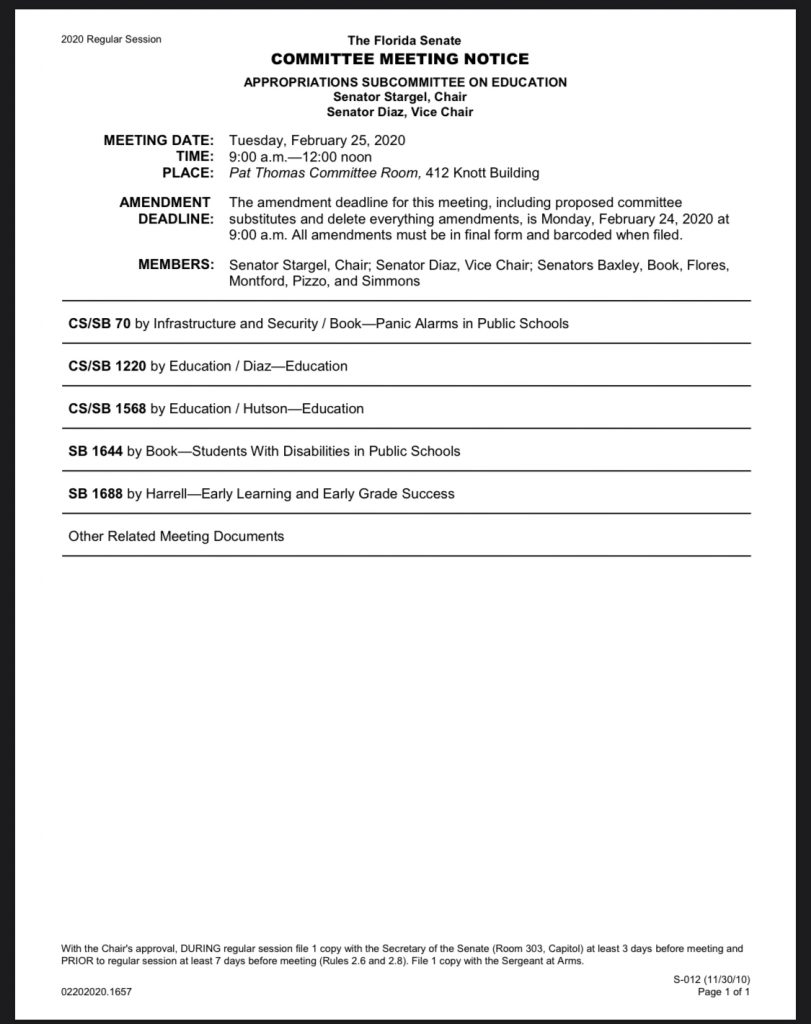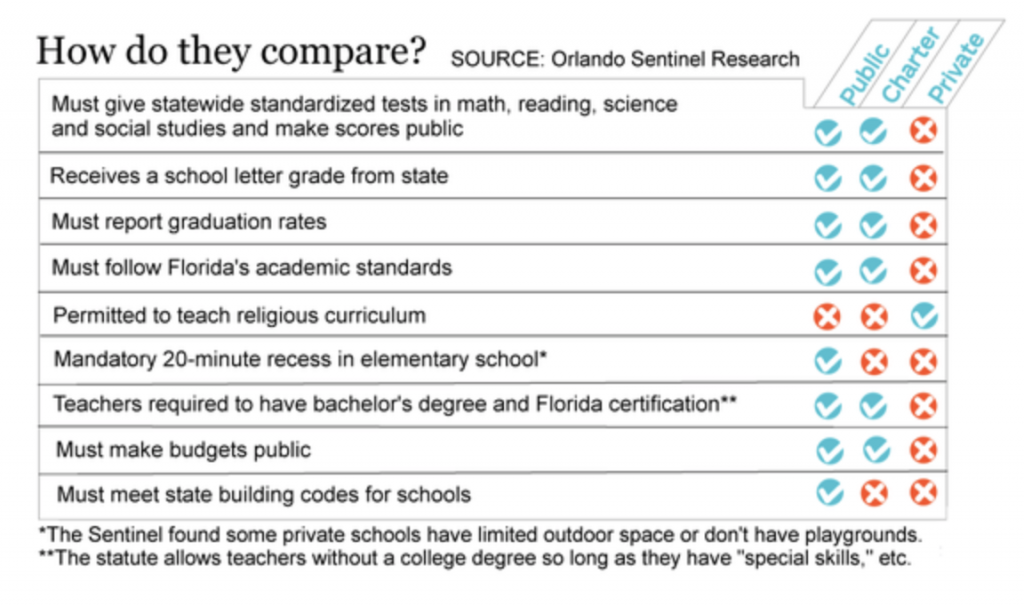CALL TO ACTION: SB1688 and SB1220
Heads up Florida!
Next Tuesday’s Senate Education Appropriations subcommittee meeting (2/25/20) will be interesting.
The agenda includes one bill (SB1688), which expands high stakes testing in the state’s largest voucher program, Voluntary Pre-Kindergarten (VPK), creating an A-F-like school grade calculation, and initiating a differential payment program to preschool providers based on that calculation (with high scoring preschools getting more money and low scoring preschools facing sanctions).
Also on the committee’s schedule is a bill (SB1220) to expand Florida’s newest voucher program, the Family Empowerment Scholarship, which is directly funded through the FEFP, despite recent revelations documenting clear anti-LGBTQ discriminatory policies at some of its participating, state-approved, private religious schools. SB1220 sponsor, Senator Manny Diaz Jr, recently dismissed concerns regarding the obvious discriminatory policies at these voucher schools saying “it’s always better to have more education choices, not less, so families can find the right fit for their kids,” suggesting state-sponsored discrimination is a-ok as long as families actively choose it. Sigh…

Please make plans to make your concerns heard regarding these concerning bills.
SB1688: VPK
SB1688 overhauls oversight and accountability in VPK, the state’s largest voucher program. A-F-like school grades will be assigned to this mostly private marketplace, based in part on standardized, progress monitoring of pre-schoolers… 4-year olds… sigh… Families accepting the VPK voucher will be required to subject their children to the state testing. Participating schools will qualify for differential payments based on the new accountability system, with more funding going to the higher performing schools (most likely those with wealthier clientel). Low performing schools (likely those in lower income neighborhoods) will face sanctions, be placed on probation or be removed from the program. In the House version of the VPK bill, HB1013, the A-F school grade system was changed to a system rating pre-schools as: “excellent,” “highly proficient,” “proficient,” “emerging proficiency,” and “unsatisfactory,” expressly forbidding the use of letter grades. Of course, “A rose by any other name would smell as sweet…” The problem is not how the levels are named but, rather, how they are calculated and how they will have high stakes attached to them.
SB1688 ALSO calls for identifying pre-schoolers who exhibit “a substantial deficiency in early literacy” and referring them to the school district for “intensive reading interventions before participating in kindergarten.”
Needless to say, we believe school grades and intensive reading interventions for preschoolers are ridiculous. Early Childhood experts testified before the House Education Committee in September and reminded legislators that, more than academics and testing, preschool is about play, collaboration, and other social and emotional lessons. At the time we wrote:
“Will Florida’s lawmakers heed the advice of these experts and let our young children play and develop their love of learning? Will lawmakers recognize play as more important to young learners than ABCs and 123s?”
SB1688 and its House companion have moved through committees, unanimously approved at every stop. In the House Education Committee, the bill’s cosponsor celebrated it as “transformational.” Lawmakers don’t appear to understand that “preschool is about play.” Now would be a good time to remind them.
SB1220: FES Expansion
Also on Tuesday’s agenda is SB1220. Originally filed as a bill addressing teacher preparation programs, SB1220 was amended at its first stop, in the Education Committee, to include expansion of the Family Empowerment voucher (FES), Florida’s newest voucher program. The FES was created last session and directly funds private, mostly religious, schools via the same funding formula that funds public schools (the FEFP).
SB1220 modifies the eligibility requirements of the Family Empowerment Scholarship (FES) and the Florida Tax Credit (FTC) scholarship, allowing current FTC recipients to transfer to FES, while expanding income caps for FTC:
- Expanding FES eligibility to a student who received a FTC scholarship in the prior year and was in a public school the year prior to initial receipt of the FTC scholarship.
- Aligning the FES and FTC scholarship eligibility and increasing FTC scholarship income eligibility threshold to 300 percent of the federal poverty level (the current income eligibility threshold for FES).
Unlike the directly tax funded FES, the Florida Tax Credit Scholarship voucher is funded by diverted corporate taxes through a tax credit scheme allowing corporations to financially benefit while contributing to the voucher program. Neither program is subject to much oversight from the state; specifically, the state does not monitor academic standards or quality, expecting parents to do their due diligence when choosing a school from the list of participating schools.
The FTC has been under scrutiny for its lax oversight. Last year, the Orlando Sentinel published a series of articles, entitled “Schools Without Rules,” outlining the nearly non-existent oversight for the state’s billion dollar voucher industry.

Then, in January, the Sentinel reported it had reviewed websites of more than 1,000 schools — most of the religious schools that take Florida scholarships — to determine their policies related to LBGTQ students. They uncovered clearly written discriminatory policies in a significant number of the schools:
In Florida last year, 156 private Christian schools with these types of anti-gay views educated more than 20,800 students with tuition paid for by state scholarships, an Orlando Sentinel investigation found.
Florida’s scholarship programs, often referred to as school vouchers, sent more than $129 million to these religious institutions. That means at least 14 percent of Florida’s nearly 147,000 scholarship students last year attended private schools where homosexuality was condemned or, at a minimum, unwelcome.
The Sentinel found 83 schools that refuse to admit LGBTQ students or could expel them if their sexual orientation or gender identity were discovered. Some also refuse to educate students whose parents are gay or to hire staff who are gay.
Another 73 schools call being gay or transgender a biblical sin but do not explain how those views play out in admissions or student discipline decisions.
Critics say Florida shouldn’t allow this discrimination at private schools that take its vouchers.”
https://www.orlandosentinel.com/news/education/os-ne-voucher-schools-lgbtq-discriminate-20200123-s5ue4nvqybcgrbrxov5hcb46a4-htmlstory.html
Florida scholarship laws currently prohibit private schools accepting its vouchers from discriminating against students based on “race, color or national origin,” but there are no such protections LGBTQ youngsters.
The Sentinel investigation set off a flurry of activity, with LGBTQ rights advocates calling for safeguards and school choice advocates defending their voucher programs. The FTC, which relies on corporate donations saw some corporations withdrawing their support. Senator Diaz worried “if (contributions are reduced) there could be less scholarships and more of a waiting list, which would be a shame.” You can read more here, here and here. Don’t miss Kathleen Oropeza’s op-ed, which highlights that Florida’s “Parent (sic) Empowerment Vouchers are also going to be spent at the same private religious schools who have anti-gay policies.”
In the midst of the controversy, SB1220 seeks to expand access to the FTC vouchers (nearly doubling the income cap to 300% of the federal poverty level) AND allow FTC recipients to simply transfer over to the directly funded FES program, where your taxes, not diverted corporate taxes, will fund their education at these schools.
CALL TO ACTION:
Two voucher systems. The largest and oldest one (VPK) is failing and getting stricter accountability measures. The newest and smallest one (FES) has blatantly discriminatory participants but is being expanded to serve more children with your tax dollars. Both are up for discussion in Tuesday’s Senate Education Appropriations committee meeting.
As quoted in The Sentinel, “I think the big question is, ‘Hey citizens of the state of Florida … Do you want your taxpayer money used in this way?”
It is time to start contacting legislators:
Appropriations Subcommittee on Education Members
Chair: Senator Kelli Stargel (R) (850) 487-5022
Vice Chair: Senator Manny Diaz, Jr. (R) (850) 487-5036
Senator Dennis Baxley (R) (850) 487-5012
Senator Lauren Book (D) (850) 487-5032
Senator Anitere Flores (R) (850) 487-5039
Senator Bill Montford (D) (850) 487-5003
Senator Jason W. B. Pizzo (D) (850) 487-5038
Senator David Simmons (R (850) 487-5009
